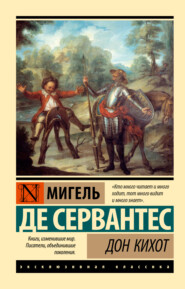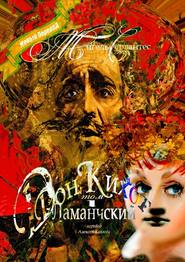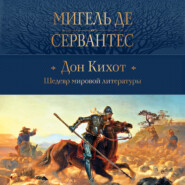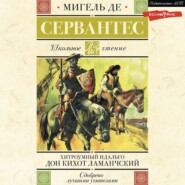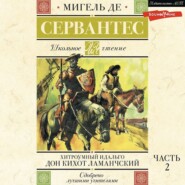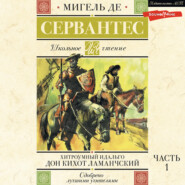По всем вопросам обращайтесь на: info@litportal.ru
(©) 2003-2025.
✖
The History of Don Quixote, Volume 1, Part 08
Настройки чтения
Размер шрифта
Высота строк
Поля
And so saying he gave Rocinante the spur, and Sancho followed him on foot and loaded, and after having partly made the circuit of the mountain they found lying in a ravine, dead and half devoured by dogs and pecked by jackdaws, a mule saddled and bridled, all which still further strengthened their suspicion that he who had fled was the owner of the mule and the saddle-pad.
As they stood looking at it they heard a whistle like that of a shepherd watching his flock, and suddenly on their left there appeared a great number of goats and behind them on the summit of the mountain the goatherd in charge of them, a man advanced in years. Don Quixote called aloud to him and begged him to come down to where they stood. He shouted in return, asking what had brought them to that spot, seldom or never trodden except by the feet of goats, or of the wolves and other wild beasts that roamed around. Sancho in return bade him come down, and they would explain all to him.
The goatherd descended, and reaching the place where Don Quixote stood, he said, "I will wager you are looking at that hack mule that lies dead in the hollow there, and, faith, it has been lying there now these six months; tell me, have you come upon its master about here?"
"We have come upon nobody," answered Don Quixote, "nor on anything except a saddle-pad and a little valise that we found not far from this."
"I found it too," said the goatherd, "but I would not lift it nor go near it for fear of some ill-luck or being charged with theft, for the devil is crafty, and things rise up under one's feet to make one fall without knowing why or wherefore."
"That's exactly what I say," said Sancho; "I found it too, and I would not go within a stone's throw of it; there I left it, and there it lies just as it was, for I don't want a dog with a bell."
"Tell me, good man," said Don Quixote, "do you know who is the owner of this property?"
"All I can tell you," said the goatherd, "is that about six months ago, more or less, there arrived at a shepherd's hut three leagues, perhaps, away from this, a youth of well-bred appearance and manners, mounted on that same mule which lies dead here, and with the same saddle-pad and valise which you say you found and did not touch. He asked us what part of this sierra was the most rugged and retired; we told him that it was where we now are; and so in truth it is, for if you push on half a league farther, perhaps you will not be able to find your way out; and I am wondering how you have managed to come here, for there is no road or path that leads to this spot. I say, then, that on hearing our answer the youth turned about and made for the place we pointed out to him, leaving us all charmed with his good looks, and wondering at his question and the haste with which we saw him depart in the direction of the sierra; and after that we saw him no more, until some days afterwards he crossed the path of one of our shepherds, and without saying a word to him, came up to him and gave him several cuffs and kicks, and then turned to the ass with our provisions and took all the bread and cheese it carried, and having done this made off back again into the sierra with extraordinary swiftness. When some of us goatherds learned this we went in search of him for about two days through the most remote portion of this sierra, at the end of which we found him lodged in the hollow of a large thick cork tree. He came out to meet us with great gentleness, with his dress now torn and his face so disfigured and burned by the sun, that we hardly recognised him but that his clothes, though torn, convinced us, from the recollection we had of them, that he was the person we were looking for. He saluted us courteously, and in a few well-spoken words he told us not to wonder at seeing him going about in this guise, as it was binding upon him in order that he might work out a penance which for his many sins had been imposed upon him. We asked him to tell us who he was, but we were never able to find out from him: we begged of him too, when he was in want of food, which he could not do without, to tell us where we should find him, as we would bring it to him with all good-will and readiness; or if this were not to his taste, at least to come and ask it of us and not take it by force from the shepherds. He thanked us for the offer, begged pardon for the late assault, and promised for the future to ask it in God's name without offering violence to anybody. As for fixed abode, he said he had no other than that which chance offered wherever night might overtake him; and his words ended in an outburst of weeping so bitter that we who listened to him must have been very stones had we not joined him in it, comparing what we saw of him the first time with what we saw now; for, as I said, he was a graceful and gracious youth, and in his courteous and polished language showed himself to be of good birth and courtly breeding, and rustics as we were that listened to him, even to our rusticity his gentle bearing sufficed to make it plain.
"But in the midst of his conversation he stopped and became silent, keeping his eyes fixed upon the ground for some time, during which we stood still waiting anxiously to see what would come of this abstraction; and with no little pity, for from his behaviour, now staring at the ground with fixed gaze and eyes wide open without moving an eyelid, again closing them, compressing his lips and raising his eyebrows, we could perceive plainly that a fit of madness of some kind had come upon him; and before long he showed that what we imagined was the truth, for he arose in a fury from the ground where he had thrown himself, and attacked the first he found near him with such rage and fierceness that if we had not dragged him off him, he would have beaten or bitten him to death, all the while exclaiming, 'Oh faithless Fernando, here, here shalt thou pay the penalty of the wrong thou hast done me; these hands shall tear out that heart of thine, abode and dwelling of all iniquity, but of deceit and fraud above all; and to these he added other words all in effect upbraiding this Fernando and charging him with treachery and faithlessness.
"We forced him to release his hold with no little difficulty, and without another word he left us, and rushing off plunged in among these brakes and brambles, so as to make it impossible for us to follow him; from this we suppose that madness comes upon him from time to time, and that some one called Fernando must have done him a wrong of a grievous nature such as the condition to which it had brought him seemed to show. All this has been since then confirmed on those occasions, and they have been many, on which he has crossed our path, at one time to beg the shepherds to give him some of the food they carry, at another to take it from them by force; for when there is a fit of madness upon him, even though the shepherds offer it freely, he will not accept it but snatches it from them by dint of blows; but when he is in his senses he begs it for the love of God, courteously and civilly, and receives it with many thanks and not a few tears. And to tell you the truth, sirs," continued the goatherd, "it was yesterday that we resolved, I and four of the lads, two of them our servants, and the other two friends of mine, to go in search of him until we find him, and when we do to take him, whether by force or of his own consent, to the town of Almodovar, which is eight leagues from this, and there strive to cure him (if indeed his malady admits of a cure), or learn when he is in his senses who he is, and if he has relatives to whom we may give notice of his misfortune. This, sirs, is all I can say in answer to what you have asked me; and be sure that the owner of the articles you found is he whom you saw pass by with such nimbleness and so naked."
For Don Quixote had already described how he had seen the man go bounding along the mountain side, and he was now filled with amazement at what he heard from the goatherd, and more eager than ever to discover who the unhappy madman was; and in his heart he resolved, as he had done before, to search for him all over the mountain, not leaving a corner or cave unexamined until he had found him. But chance arranged matters better than he expected or hoped, for at that very moment, in a gorge on the mountain that opened where they stood, the youth he wished to find made his appearance, coming along talking to himself in a way that would have been unintelligible near at hand, much more at a distance. His garb was what has been described, save that as he drew near, Don Quixote perceived that a tattered doublet which he wore was amber-tanned, from which he concluded that one who wore such garments could not be of very low rank.
Approaching them, the youth greeted them in a harsh and hoarse voice but with great courtesy. Don Quixote returned his salutation with equal politeness, and dismounting from Rocinante advanced with well-bred bearing and grace to embrace him, and held him for some time close in his arms as if he had known him for a long time. The other, whom we may call the Ragged One of the Sorry Countenance, as Don Quixote was of the Rueful, after submitting to the embrace pushed him back a little and, placing his hands on Don Quixote's shoulders, stood gazing at him as if seeking to see whether he knew him, not less amazed, perhaps, at the sight of the face, figure, and armour of Don Quixote than Don Quixote was at the sight of him. To be brief, the first to speak after embracing was the Ragged One, and he said what will be told farther on.
As they stood looking at it they heard a whistle like that of a shepherd watching his flock, and suddenly on their left there appeared a great number of goats and behind them on the summit of the mountain the goatherd in charge of them, a man advanced in years. Don Quixote called aloud to him and begged him to come down to where they stood. He shouted in return, asking what had brought them to that spot, seldom or never trodden except by the feet of goats, or of the wolves and other wild beasts that roamed around. Sancho in return bade him come down, and they would explain all to him.
The goatherd descended, and reaching the place where Don Quixote stood, he said, "I will wager you are looking at that hack mule that lies dead in the hollow there, and, faith, it has been lying there now these six months; tell me, have you come upon its master about here?"
"We have come upon nobody," answered Don Quixote, "nor on anything except a saddle-pad and a little valise that we found not far from this."
"I found it too," said the goatherd, "but I would not lift it nor go near it for fear of some ill-luck or being charged with theft, for the devil is crafty, and things rise up under one's feet to make one fall without knowing why or wherefore."
"That's exactly what I say," said Sancho; "I found it too, and I would not go within a stone's throw of it; there I left it, and there it lies just as it was, for I don't want a dog with a bell."
"Tell me, good man," said Don Quixote, "do you know who is the owner of this property?"
"All I can tell you," said the goatherd, "is that about six months ago, more or less, there arrived at a shepherd's hut three leagues, perhaps, away from this, a youth of well-bred appearance and manners, mounted on that same mule which lies dead here, and with the same saddle-pad and valise which you say you found and did not touch. He asked us what part of this sierra was the most rugged and retired; we told him that it was where we now are; and so in truth it is, for if you push on half a league farther, perhaps you will not be able to find your way out; and I am wondering how you have managed to come here, for there is no road or path that leads to this spot. I say, then, that on hearing our answer the youth turned about and made for the place we pointed out to him, leaving us all charmed with his good looks, and wondering at his question and the haste with which we saw him depart in the direction of the sierra; and after that we saw him no more, until some days afterwards he crossed the path of one of our shepherds, and without saying a word to him, came up to him and gave him several cuffs and kicks, and then turned to the ass with our provisions and took all the bread and cheese it carried, and having done this made off back again into the sierra with extraordinary swiftness. When some of us goatherds learned this we went in search of him for about two days through the most remote portion of this sierra, at the end of which we found him lodged in the hollow of a large thick cork tree. He came out to meet us with great gentleness, with his dress now torn and his face so disfigured and burned by the sun, that we hardly recognised him but that his clothes, though torn, convinced us, from the recollection we had of them, that he was the person we were looking for. He saluted us courteously, and in a few well-spoken words he told us not to wonder at seeing him going about in this guise, as it was binding upon him in order that he might work out a penance which for his many sins had been imposed upon him. We asked him to tell us who he was, but we were never able to find out from him: we begged of him too, when he was in want of food, which he could not do without, to tell us where we should find him, as we would bring it to him with all good-will and readiness; or if this were not to his taste, at least to come and ask it of us and not take it by force from the shepherds. He thanked us for the offer, begged pardon for the late assault, and promised for the future to ask it in God's name without offering violence to anybody. As for fixed abode, he said he had no other than that which chance offered wherever night might overtake him; and his words ended in an outburst of weeping so bitter that we who listened to him must have been very stones had we not joined him in it, comparing what we saw of him the first time with what we saw now; for, as I said, he was a graceful and gracious youth, and in his courteous and polished language showed himself to be of good birth and courtly breeding, and rustics as we were that listened to him, even to our rusticity his gentle bearing sufficed to make it plain.
"But in the midst of his conversation he stopped and became silent, keeping his eyes fixed upon the ground for some time, during which we stood still waiting anxiously to see what would come of this abstraction; and with no little pity, for from his behaviour, now staring at the ground with fixed gaze and eyes wide open without moving an eyelid, again closing them, compressing his lips and raising his eyebrows, we could perceive plainly that a fit of madness of some kind had come upon him; and before long he showed that what we imagined was the truth, for he arose in a fury from the ground where he had thrown himself, and attacked the first he found near him with such rage and fierceness that if we had not dragged him off him, he would have beaten or bitten him to death, all the while exclaiming, 'Oh faithless Fernando, here, here shalt thou pay the penalty of the wrong thou hast done me; these hands shall tear out that heart of thine, abode and dwelling of all iniquity, but of deceit and fraud above all; and to these he added other words all in effect upbraiding this Fernando and charging him with treachery and faithlessness.
"We forced him to release his hold with no little difficulty, and without another word he left us, and rushing off plunged in among these brakes and brambles, so as to make it impossible for us to follow him; from this we suppose that madness comes upon him from time to time, and that some one called Fernando must have done him a wrong of a grievous nature such as the condition to which it had brought him seemed to show. All this has been since then confirmed on those occasions, and they have been many, on which he has crossed our path, at one time to beg the shepherds to give him some of the food they carry, at another to take it from them by force; for when there is a fit of madness upon him, even though the shepherds offer it freely, he will not accept it but snatches it from them by dint of blows; but when he is in his senses he begs it for the love of God, courteously and civilly, and receives it with many thanks and not a few tears. And to tell you the truth, sirs," continued the goatherd, "it was yesterday that we resolved, I and four of the lads, two of them our servants, and the other two friends of mine, to go in search of him until we find him, and when we do to take him, whether by force or of his own consent, to the town of Almodovar, which is eight leagues from this, and there strive to cure him (if indeed his malady admits of a cure), or learn when he is in his senses who he is, and if he has relatives to whom we may give notice of his misfortune. This, sirs, is all I can say in answer to what you have asked me; and be sure that the owner of the articles you found is he whom you saw pass by with such nimbleness and so naked."
For Don Quixote had already described how he had seen the man go bounding along the mountain side, and he was now filled with amazement at what he heard from the goatherd, and more eager than ever to discover who the unhappy madman was; and in his heart he resolved, as he had done before, to search for him all over the mountain, not leaving a corner or cave unexamined until he had found him. But chance arranged matters better than he expected or hoped, for at that very moment, in a gorge on the mountain that opened where they stood, the youth he wished to find made his appearance, coming along talking to himself in a way that would have been unintelligible near at hand, much more at a distance. His garb was what has been described, save that as he drew near, Don Quixote perceived that a tattered doublet which he wore was amber-tanned, from which he concluded that one who wore such garments could not be of very low rank.
Approaching them, the youth greeted them in a harsh and hoarse voice but with great courtesy. Don Quixote returned his salutation with equal politeness, and dismounting from Rocinante advanced with well-bred bearing and grace to embrace him, and held him for some time close in his arms as if he had known him for a long time. The other, whom we may call the Ragged One of the Sorry Countenance, as Don Quixote was of the Rueful, after submitting to the embrace pushed him back a little and, placing his hands on Don Quixote's shoulders, stood gazing at him as if seeking to see whether he knew him, not less amazed, perhaps, at the sight of the face, figure, and armour of Don Quixote than Don Quixote was at the sight of him. To be brief, the first to speak after embracing was the Ragged One, and he said what will be told farther on.






